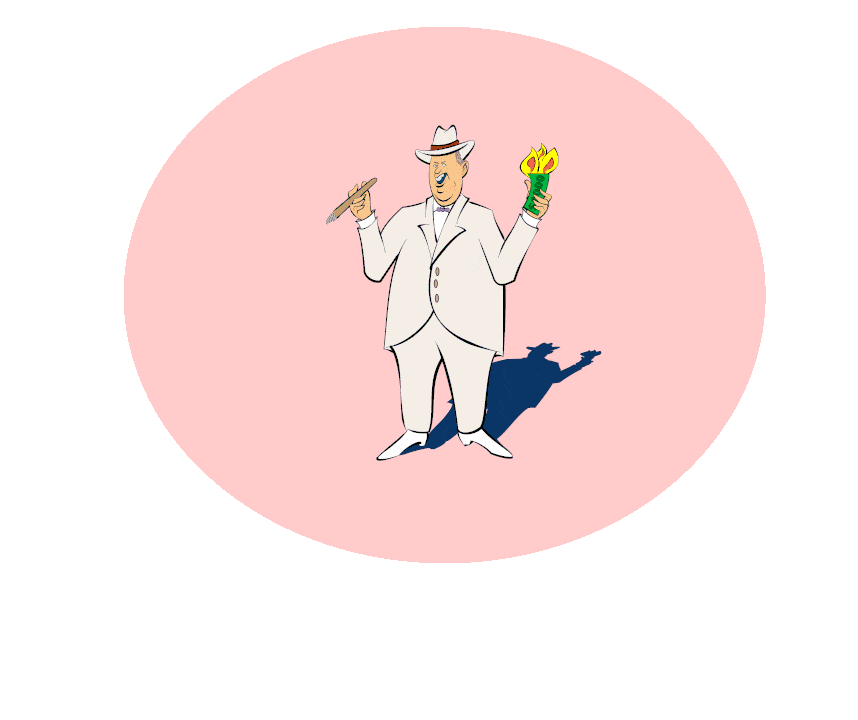Enough Elvises
for Everybody
(Click to Zoom In and Out)
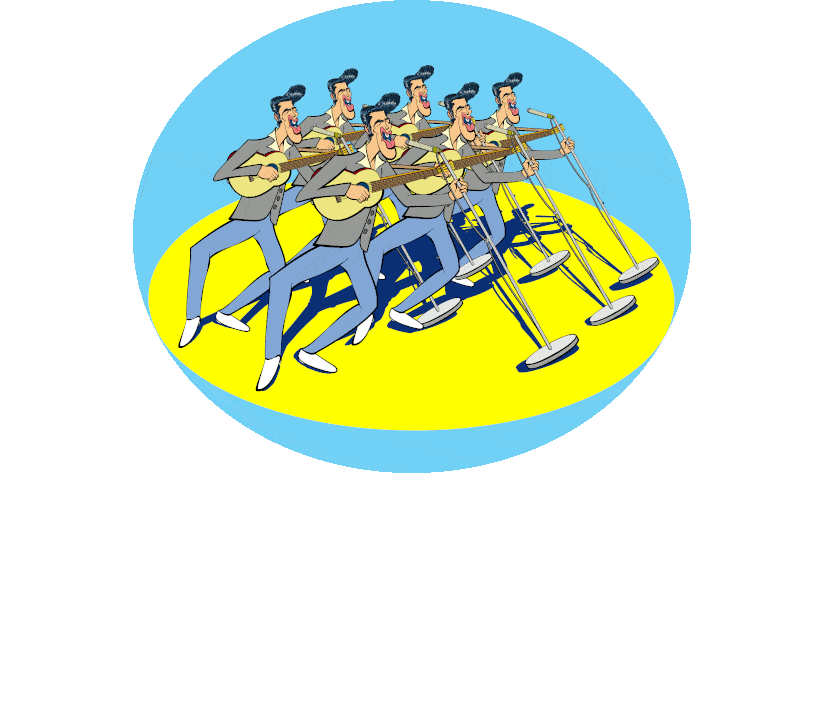
In which references to the etymology of one of the most important musical genres in history are investigated and evaluated for accuracy and completeness, and a hypothesis is put forward that the accepted wisdom as vouched for by major informational sources may be in error and have unintentionally detracted from the recognition of a great musical talent.
There have been Elvis imitators literally as along as there has been Elvis. As early as the mid-1950's you'd have the gyrating mimicry from the likes of Steve Allen, Peter Lind Hayes, and Red Skelton whoever they were.
Of course, the preferred term is Elvis tribute artists. But one of the early Elvis imitators - sorry, that's Elvis tribute artists - was none other than Elvis himself!
Ironically, Elvis tributing Elvis came about because of one of his least successful appearances. Everyone knows that starting in 1969, Elvis began a seven year contract with the Las Vegas Hilton. He performed over 600 times at the hotel and 58 of the shows were consecutive sell-outs. For the rest of his life Elvis and Vegas were virtually synonymous.
But Elvis's first appearance in Las Vegas was in 1956 at the New Frontier Hotel. The opening show was on April 23 (Shakespeare's birthday) and was - to quote one critic - "a flop".
The reasons are not difficult to fathom. For one thing the audiences at the Las Vegas casinos were not made up of the young teenage girls - even then still often called "bobby soxers" - who at that time were Elvis's biggest fans. Instead, it consisted largely of middle age and even elderly women who along with their husbands were taking in the shows as a brief respite from their hours at the gaming tables.
So not surprisingly the audience reaction was largely one of perplexed attention followed by polite applause. The run at the New Frontier - certainly one of Colonel Tom Parker's biggest boners - was cut short and ended after three weeks.
But while he was in Vegas, Elvis himself took in some of the shows. Appearing at the Sahara was Billy Ward and his group, The Dominoes. Billy had been a musical prodigy, playing classical piano when a kid, but after World War II he began performing more popular (and lucrative) music.
One of the songs Elvis heard was sung by the Dominoes' lead singer Jackie Wilson. Elvis referred to the performance as a "take-off" of his song "Don't Be Cruel". But Elvis enjoyed Jackie's rendition which was at a moderate tempo and with a strong accent on the upbeat. Elvis even said Jackie sang the song better than he did.
After Elvis's Vegas run ended, he returned to his hectic touring schedule. On consecutive nights he might appear in Madison, Wisconsin; Memphis, Tennessee; Little Rock, Arkansas; Springfield, Missouri; Wichita, Kansas; Lincoln, Nebraska; Omaha, Nebraska; Overland Park, Kansas; Des Moines, Iowa; Sioux Falls, South Dakota; Kansas City, Missouri; Detroit, Michigan; Columbus, Ohio; and Dayton, Ohio, before getting a few days off. So you can imagine by the end of the year, Elvis was pretty tired and was glad to get back home to Memphis.
They dropped by:

Carl
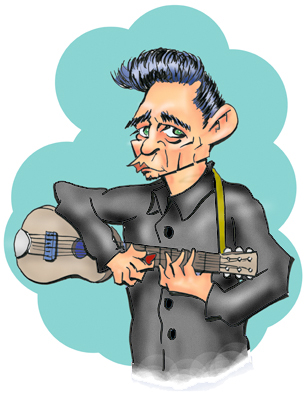
Johnny

Jerry
On December 4 Elvis dropped by the Sun Record Studios run by Sam Phillips. It was at Sun where two years earlier Sam had recorded Elvis's first commercial release, "That's All Right" which had launched his career.
The visit was mostly for old times' sake since Colonel Tom had bought out Elvis's contract from Sun so he could sign Elvis up with RCA, a "prestige" label. Sam's asking price of $35,000 was intended to scare Colonel Tom off, but Tom finessed him by paying up.
Carl Perkins - who had written and recorded "Blue Suede Shoes" before Elvis's "cover" version - was in the studio making some new records. Then at some point Johnny Cash and Jerry Lee Lewis, both who were also recording for Sun, dropped by.
During a break everybody gathered in the back and they began playing and singing songs - "jamming" as the musical cognoscenti say. Elvis - who brought along a young lady he had met in Las Vegas named Marilyn Evans - sat down at the piano. The recording engineer turned on the tape recorder and "The Million Dollar Quartet" was captured for posterity.
At one point Elvis mentioned seeing Billy Ward and His Dominoes when he was in Vegas. He began to demonstrate how they sang "Don't Be Cruel". The microphones were not optimally placed and so Elvis's singing is a little muted, but you can hear Elvis imitating Jackie Wilson imitating Elvis. Elvis later became a big fan of Jackie and his music.
Jackie Wilson is not well-known to the general public today. But he had six Top 10 hits on Billboard's Hot 100 list and an equal number of #1 Hits on Billboard's Rhythm and Blues Chart. The latter songs were "Lonely Teardrops" (1958), "You Better Know It" (1959), "A Woman, a Lover, a Friend" (1960), "Doggin' Around" (1960), "Baby Workout" (1963), and "Your Love Keeps Lifting Me Higher and Higher (1967). So musicologist today usually cite Jackie as a rhythm and blues singer, the music that directly led to rock and roll.
OK. So who coined the phrase rhythm and blues? And when? We've always wanted to know that.
No doubt you have, as Captain Mephisto said to Sidney Brand. It's very simple really.
Most sources state that rhythm and blues was used to replace the term "race records" which was becoming increasingly objectionable. In any case the "race" designation was too generic to describe the varied and diverse songs that were created by African American musicians.
Primary research - often decried on popular informational websites - bears this out. In issues of Billboard Magazine up to June 18, 1949, the phrase rhythm and blues or its variant designations like R&B simply aren't found. Instead the magazine would refer to the "Best Selling Retail Race Records" when listing songs of musicians and singers like John Lee Hooker, Billy Mitchell, Pee Wee Clayton, Jay MacNeely, and Dinah Washington.
But a week later, on June 25, 1949, we read in Billboard about the "Best Selling Retail Rhythm & Blues Records". From then on references to "race records" disappear and for the good.
Titans
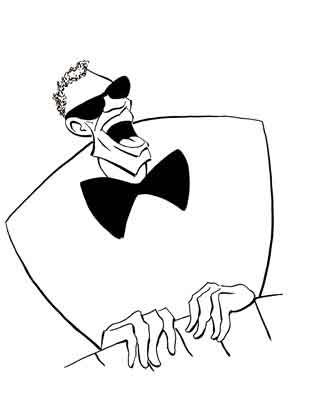
Ray
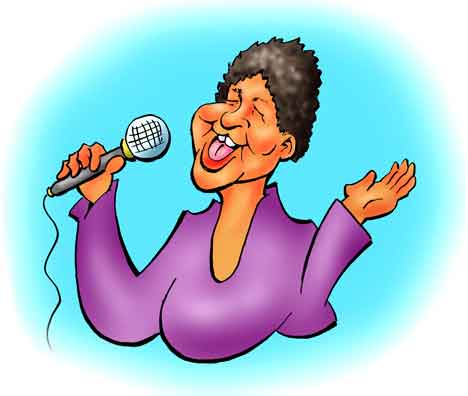
Aretha
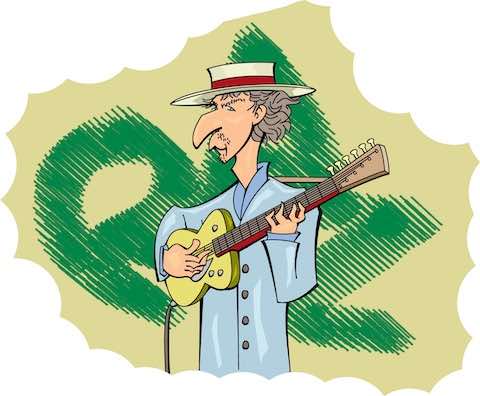
... and some chap.
Many popular sources credit the coinage of the phrase "rhythm and blues" to Jerry Wexler when as a young writer he began contributing to Billboard. Later of course Jerry became one of the most important R&B record producers and worked with some of the musical titans like Ray Charles, Aretha Franklin, Dusty Springfield, and some chap who later went on to win a Nobel Prize.
Exactly when Jerry coined the phrase, though, is problematical and the dates given by - quote - "reliable secondary sources" - unquote - can vary. But a sampling of the Billboard back issues shows Jerry is first listed on the magazine's masthead on June 19, 1948, as one of "The Music Staffs" (no doubt a very humorous pun) which is also the issue when articles with his by-line began appearing.
To confuse things even further, there are articles that state that Jerry coined the word in 1947 but didn't actually initiate the name change of the music to rhythm and blues until 1949.1 But if this were true, then he coined the word when he was only twenty years old and before he began to write for Billboard.
Footnote
Another popular source says the phrase rhythm and blues was used in the modern sense as early as 1933. But there was no documentation given.
So we see that the most reasonable telling is Jerry had been writing for Billboard for about a year. Then in mid-1949 he convinced the editors to change the "race" designation to rhythm and blues.
So we now have the origin of the term rhythm and blues, n'est-ce pas?
Weeeehhheeeeeeellllll, hold on there, mesdames et messieurs.
Like chemical mechanistic studies, determining when words and phrases are first created, used, and by whom are seldom proven but at times can be disproved. Fortunately through modern information technology with its artificial non-intelligence, it's possible to sift through the publications and find if a term was used or it wasn't. And what you'll find is - to quote Artie Johnson - veeeeerrrrrryyyyyy interesting.
There is no intention here to detract from Jerry's undoubted importance in the history of popular music. Certainly he should be given credit for his merit in implementing the word rhythm and blues to replace the "race" term.
But in July, 1947, two newspapers, The Mississippi Enterprise and The Arkansas State Press, printed ads inviting young people to show their skills in singing, dancing, or musicianship. These particular contests were organized by Lucky Millinder who was the leader of the Rhythm Blues Band. Lucky's "Talent Discovery Quest" - sort of an early day Star Search or [Fill in the Blank] Got Talent - was pretty wide open to a variety of performers.
And in the ads we read the type of modus musicandi that Lucky was looking for:
IF YOU SING -- IF YOU DANCE
IF YOU SEEK A PROFESSIONAL STAGE CAREER
FAME & FORTUNE MAY BE YOURS
SINGERS INSTRUMENTALISTS
QUARTETS TRIOS
MALE - FEMALE - MIXED GROUPS (over 18)
INVITED TO COMPETE
SPIRITUALS AND FOLK SONGS
POPULAR RHYTHM AND BLUES
FABULOUS AWARDS TO FINAL WINNERS
Yep. One of the types of music that Lucky was seeking was called rhythm and blues.
So we definitely see the phrase "rhythm and blues" was being used to describe a specific popular musical class no later than 1947. And this early use was NOT in Billboard Magazine but in two African American newspapers. Admittedly, this was about the time some sources actually claim Jerry coined the word. So it can't yet be ruled out that the phrase originated with him.
Stormy Weather
starring
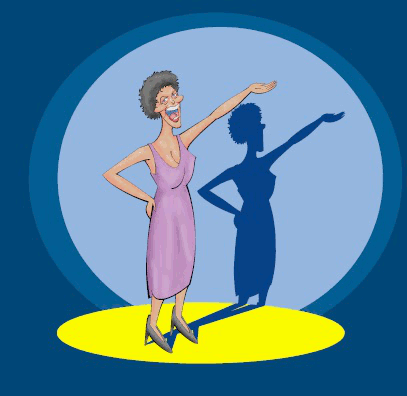
Lena
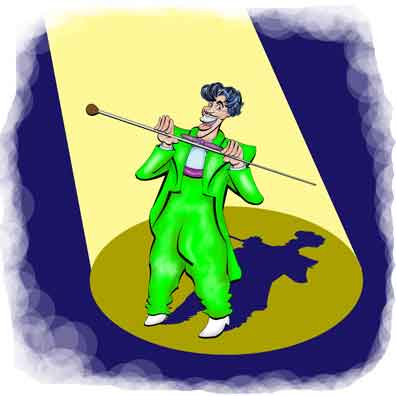
Cab

...Fats.
There is, though, an even earlier reference where rhythm and blues clearly refers to a musical genre. On March 31, 1945, three weeks after Germany's surrender in World War II, an article appeared about an upcoming USO show at the at Bradley Field Army Air Force Base at Windsor Locks, Connecticut. And before the main feature - a showing of the motion picture Stormy Weather starring Lena Horne, Cab Calloway, and Fats Waller - there would be some live performances. As the show was described:
Master of Ceremonies of the Camp Show will be Harvey Dunne, a magician and comedian who has been mystifying audiences at Clubs throughout the United States for the past twenty-five years. Tall, slender, auburn haired Trudy Chandler will provide rhythm and blues [emphasis added] singing for the audience. Trudy got her start on the stage by appearing on the Horn and Hardart children’s radio program and has since appeared with Phil Spitalny’s All Girl Band.
So here's a clearly documented case of the music being called rhythm and blues by the end of March, 1945. This was four years before the Billboard issue and two years before the earliest claim of Jerry's coinage.
Well, is there an even earlier use? Well, for all practical purposes, yes. In February 1945, in a caption for the photographs of singers Judy Carol and Wynonie Harris we read:
THEY 'GIVE OUT' RHYTHM AND THE BLUES!
Yes, it's Judy! The lovely pin-up favorite, Judy Carol, and Wynonie Harris are the vocal stars featured with Lucky Millinder and His Orchestra which is currently on tour. The band has won commendable praise for its rendition of the tune "Rainy Sunday." Written by Lucky, A. Franklin and "Blackie" Warren, it is also presented by Count Basie, Earl Hines, Benny Goodman and several other name bands.
So the definite article notwithstanding, in early 1945 we are reading about rhythm and blues as a musical category. And if you didn't catch it, both Judy and Wynonie were with Lucky's Millinder's band!
So who invented the famous phrase? Well, likely there was no one single instance of coinage. Instead we are seeing the gradual agglomeration of two musical words until they become fixed in usage and accepted and later iconic. But if we MUST pick one individual on whom to bestow the honor, for now we'll go with Lucky Millinder.
References and Further Reading
"Where Elvis Performed in Las Vegas: Then and Now", Taylor Lane, Las Vegas Review-Journal, June 21, 2022.
"Elvis Gyrates Upward", TeleVue Magazine, Page 1, [Washington, D. C.] Evening Star, December 16, 1956.
"Billy Ward and His Dominoes to Play Club 16-Weeks", Bernie Harrison, The Detroit Tribune, March 12, 1955, Page 4.
"New Frontier Hotel and Casino", Las Vegas Museum, April 4, 2021.
In Search Of Elvis: Music, Race, Art, Religion Vernon Chadwick, Routledge, 1997.
"They Give Out 'Rhythm' and the 'Blues'", The Mississippi Enterprise, February 10, 1945, Page 1.
"Frankly Speaking", Frank Marshal Daves, The Chicago Star, August 31, 1946, Page 1.
"Record Row", Betty Miles, The [Washington, D. C.] Evening Star, September 12, 1948, Page D-8.
"Officers' Wives to Sponsor Show For Red Cross", The Key West Citizen, March 8, 1947, Page 4.
"Tiny and Savannah Team for Big Tour", Screen, Radio, Stage, The Detroit Tribune, March 19, 1947, Page 13.
"If You Sing, Dance, Or Play Music, Be On Hand at Rink, July 6", The Mississippi Enterprise, July 4, 1947, Page 1.
"Lucky Millinder's 1947, Nat'l Talent Discovery Quest", Arkansas State Press, July 25, 1947, Page 4.
"Jerry Wexler: The Man Who Invented Rhythm & Blues", Ashley Kahn, Rolling Stone, August 15, 2008.
"Arkansas State Press", Grif Stockley, Encyclopedia of Arkansas, accessed March 21, 2023.
"Rhythm and Blues", The New Grove Dictionary of American Music, H. Wiley Hitchcock and Stanley Sadie (editors), MacMillan Press Limited (London), Grove's Dictionaries of Music, Inc. (New York), 1986.
"State", The Waterbury Democrat, January 12, 1942, Page 13.
"Jubilee of Jive Comes to Strand", The Waterbury Democrat, May 7, 1943, Page 10.
"For My People", Margaret Walker, The Omaha Guide, May 18, 1944, Page 4.
"Five Acts of Vaudeville at Theater Wednesday", Margaret Walker, Bradley [Connecticut] Beam, March 31, 1945, Page 1.
"Specialized Disk Sales Advance", Tony Wilson and Jerry Wexler, Billboard NAMM Convention Section, June 19, 1948, p. 20.
"Tiny and Savannah Team for Big Tour", Screen, Radio, Stage, The Detroit Tribune, March 8, 1947, Page 13.
"On the Stand", Jerry Wexler, Billboard, July 24, 1948, p. 35.
"Gabor's 39c Disk Expansion", Jerry Wexler, Billboard, August 7, 1948, p. 18.
"Billboard Backstage: A PS (Petrillo and Sarnoff) to Ban's End; Other Assorted Items", Joe Csida, Billboard, December 25, 1948, p. 1.
"AFM Tightens 10% Travel. Tax Procedure; Agencies, Orks, Fear Harassment", Jerry Wexler and Hal Webman, Billboard, February 5, 1949, p. 18.
"On the Stand", Jerry Wexler, Billboard, January 8, 1949, p. 35.
"AFM Starts New Campaign To Bring Back Vaudeville", Jerry Wexler, Billboard, February 12, 1949.
"Young ASCAP Writers Organize", Jerry Wexler, Billboard, June 11, 1949.
"Jerry Wexler: A Record Man Remembered", Ashley Kahn, National Public Radio, August 15, 2008.
"Lucky Millinder: Big Band Rhythm & Blues", Christopher Popa, Big Band Library, November 2005.
"Secular Rhythm & Blues:, Timeline of African American Music: 1940 - 1960s, Carnegie Hall.
"R&B Music Guide: The Evolution of Rhythm and Blues", Master Class, June 7, 2021.
"Rhythm and Blues", Encyclopedia Britannica.
"rhythm and blues", Merriam-Websters Dictionary.
